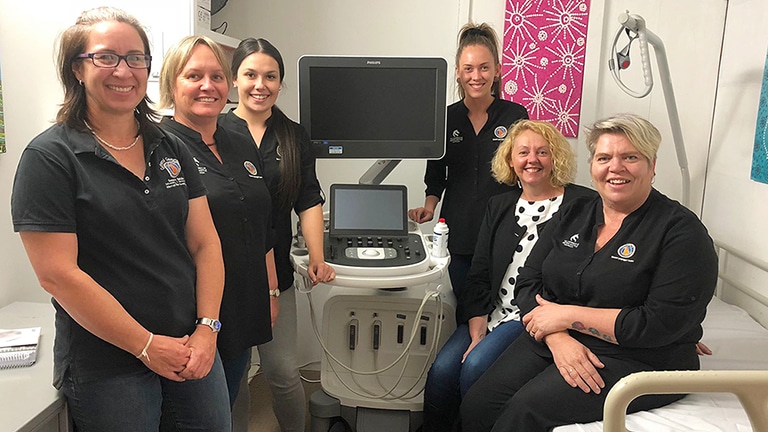
Staff at Tamworth’s Gomeroi Gaaynggal Centre are relieved after unveiling new ultrasound equipment to support expectant Indigenous mothers.

Staff at Tamworth’s Gomeroi Gaaynggal Centre breathed a deep sigh of relief yesterday after unveiling new ultrasound equipment that allows the continuation of its vital health and research support for expectant Indigenous mothers.
Following multiple repairs, the centre’s previous scanning unit had reached the end of its service life and been declared unfit for use. It threatened to leave a major gap in the antenatal services offered by the Indigenous pregnancy program, with no funding or loan options readily available.
The University of Newcastle (UON) and Hunter Medical Research Institute (HMRI) then stepped in, along with community members, to secure the $84,000 needed to buy a new, high-resolution Philips ultrasound machine.
The UON provided $50,000 via its Faculty of Health and Medicine, and Research and Innovation division, Tamworth residents Tony and Karen Haggarty gave almost $16,000, the Bloomfield Group a further $10,000 and Tamworth Rugby Union Club donated the final $8,200.
“I’d been incredibly worried about it because our research was in absolute jeopardy,” Program Director Associate Professor Kym Rae says. “We’d done so much work to build up the study and, without the ultrasound, we risked losing the buy-in of our pregnant mums and the community.
“We pride ourselves on providing the best possible care to Indigenous women, so we need an accurate and reliable unit. Our ultrasound partners in Tamworth were happy to help in the interim, but that would require our participants to use mainstream services they’re less comfortable with.”
Mothers engaged in the Gomeroi gaaynggal project undergo three scans – the first to determine pregnancy timing, the second ensure the baby is developing as they should, and the final to look at growth and wellbeing.
“Many babies in Indigenous communities are born small and can have a condition called intrauterine growth retardation, which can be picked up during the final ultrasound,” Associate Professor Rae adds. “From a research perspective, we can also look at kidney development and make sure they’re on track. If not, we can work with clinicians before and after the birth.”
Having nurtured a relationship with mothers during their pregnancy, researchers then aim to continue it for 10 years post-birth. A solid foundation of trust and care is required to retain them.
The Tamworth Magpies rugby club threw its weight behind the cause, conducting a fundraiser as part of the club’s Ladies’ Day activities in July. Players wore a special pink jersey adorned with flowers and the HMRI logo, which were auctioned after the game.
“This is the first year Tamworth Magpies Ladies’ Day has raised funds for another community group in Tamworth,” functions coordinator Simone Upton explains. “It’s women supporting other women, and there is no better way to show our community we care.”
Contact Gomeroi Gaaynggal on (02) 67621 034, 6755 3582 or [email protected].
* HMRI is a partnership between the University of Newcastle, Hunter New England Health and the community.
HMRI would like to acknowledge the Traditional Custodians of the land on which we work and live, the Awabakal and Worimi peoples, and pay our respects to Elders past and present. We recognise and respect their cultural heritage and beliefs and their continued connection to their land.

Hunter Medical Research Institute
We’re taking healthy further.
Locked Bag 1000
New Lambton
NSW, Australia, 2305



This site is protected by reCAPTCHA and the Google Privacy Policy and Terms of Service apply.
Copyright © 2024 Hunter Medical Research Institute | ABN: 27 081 436 919
Site by Marlin Communications
